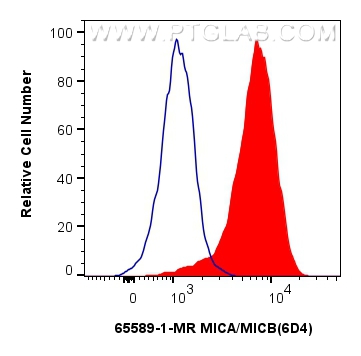验证数据展示
经过测试的应用
| Positive FC detected in | HeLa cells |
推荐稀释比
| 应用 | 推荐稀释比 |
|---|---|
| This reagent has been tested for flow cytometric analysis. It is recommended that this reagent should be titrated in each testing system to obtain optimal results. | |
| Sample-dependent, Check data in validation data gallery. | |
产品信息
65589-1-MR targets MICA/MICB in FC applications and shows reactivity with Human samples.
| 经测试应用 | FC Application Description |
| 经测试反应性 | Human |
| 免疫原 | Transfected C1R cells expressing MICA 种属同源性预测 |
| 宿主/亚型 | Mouse / IgG2a |
| 抗体类别 | Recombinant |
| 产品类型 | Antibody |
| 全称 | MHC class I polypeptide-related sequence A |
| 别名 | |
| 计算分子量 | 383 aa, 43 kDa |
| GenBank蛋白编号 | BC016929 |
| 基因名称 | MICA |
| Gene ID (NCBI) | 100507436 |
| RRID | AB_3670339 |
| 偶联类型 | Unconjugated |
| 形式 | Liquid |
| 纯化方式 | Protein A purification |
| 储存缓冲液 | PBS with 0.09% sodium azide. |
| 储存条件 | Store at 2-8°C. Stable for one year after shipment. |
背景介绍
Human MHC class I chain-related genes located within the HLA class I region of chromosome 6 encode MHC class I chain-related A and B (MICA and MICB) (PMID: 11429322). MICA and MICB are stress-inducible surface molecules that are not associated with β2-microglobulin and do not present peptides (PMID: 9497295). They are expressed in intestinal epithelium and many epithelial tumors (PMID: 10359807). MICA and MICB are ligands for NKG2D which is an activating receptor that is expressed on most natural killer (NK) cells, CD8 αβ T cells, and γδ T cells (PMID: 10426993; 11491531). The monoclonal antibody 6D4 recognizes MICA and MICB.
实验方案
| Product Specific Protocols | |
|---|---|
| FC protocol for MICA/MICB antibody 65589-1-MR | Download protocol |
| Standard Protocols | |
|---|---|
| Click here to view our Standard Protocols |
